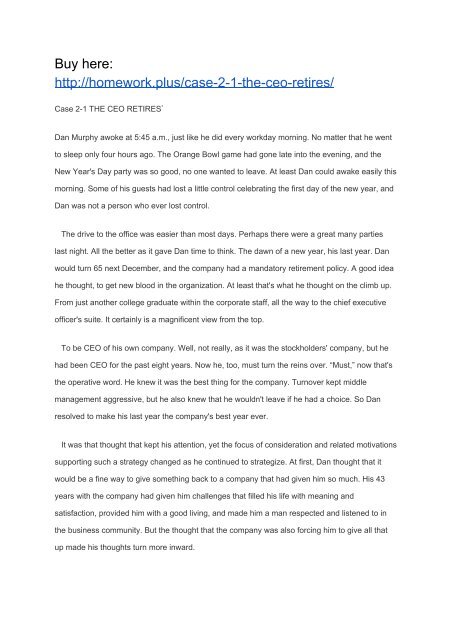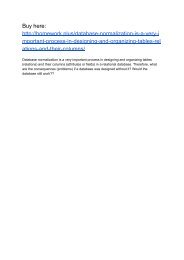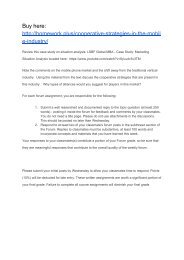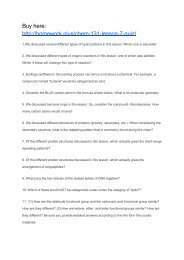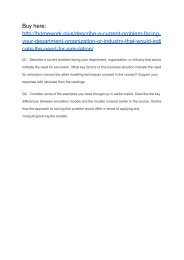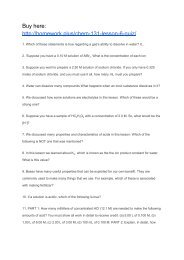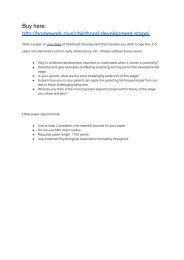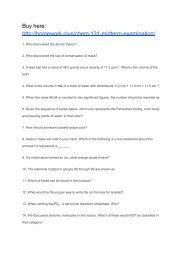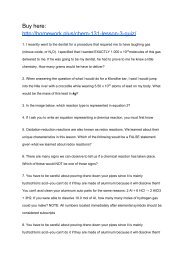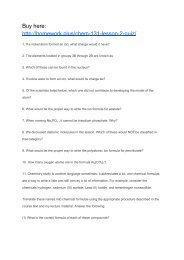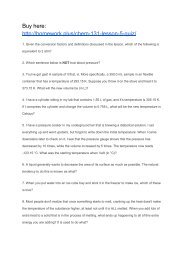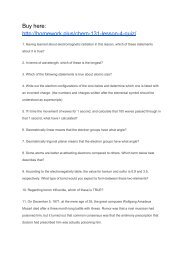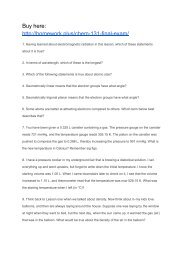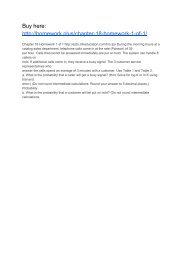Case 2-1 THE CEO RETIRES
Case 2-1 THE CEO RETIRES
Case 2-1 THE CEO RETIRES
Create successful ePaper yourself
Turn your PDF publications into a flip-book with our unique Google optimized e-Paper software.
Buy here:<br />
http://homework.plus/case-2-1-the-ceo-retires/<br />
<strong>Case</strong> 2-1 <strong>THE</strong> <strong>CEO</strong> <strong>RETIRES</strong> *<br />
Dan Murphy awoke at 5:45 a.m., just like he did every workday morning. No matter that he went<br />
to sleep only four hours ago. The Orange Bowl game had gone late into the evening, and the<br />
New Year's Day party was so good, no one wanted to leave. At least Dan could awake easily this<br />
morning. Some of his guests had lost a little control celebrating the first day of the new year, and<br />
Dan was not a person who ever lost control.<br />
The drive to the office was easier than most days. Perhaps there were a great many parties<br />
last night. All the better as it gave Dan time to think. The dawn of a new year, his last year. Dan<br />
would turn 65 next December, and the company had a mandatory retirement policy. A good idea<br />
he thought, to get new blood in the organization. At least that's what he thought on the climb up.<br />
From just another college graduate within the corporate staff, all the way to the chief executive<br />
officer's suite. It certainly is a magnificent view from the top.<br />
To be <strong>CEO</strong> of his own company. Well, not really, as it was the stockholders' company, but he<br />
had been <strong>CEO</strong> for the past eight years. Now he, too, must turn the reins over. “Must,” now that's<br />
the operative word. He knew it was the best thing for the company. Turnover kept middle<br />
management aggressive, but he also knew that he wouldn't leave if he had a choice. So Dan<br />
resolved to make his last year the company's best year ever.<br />
It was that thought that kept his attention, yet the focus of consideration and related motivations<br />
supporting such a strategy changed as he continued to strategize. At first, Dan thought that it<br />
would be a fine way to give something back to a company that had given him so much. His 43<br />
years with the company had given him challenges that filled his life with meaning and<br />
satisfaction, provided him with a good living, and made him a man respected and listened to in<br />
the business community. But the thought that the company was also forcing him to give all that<br />
up made his thoughts turn more inward.
Of course, the company had done many things for him, but what of all the sacrifices he had<br />
made? His whole heart and soul were tied to the company. In fact, one could hardly think of Dan<br />
Murphy without thinking of the company, in much the same way as prominent corporate leaders<br />
and their firms are intrinsically linked. But the company would still be here this time next year,<br />
and what of him? Yes, he would leave the company strong, because by leaving it strong, it would<br />
strengthen his reputation as a great leader. His legacy would carry and sustain him over the<br />
years. But would it? One must also live in a manner consistent with such esteem.<br />
Being the <strong>CEO</strong> of a major company also has its creature comforts. Dan was accustomed to a<br />
certain style of living. How much will that suffer after the salary, bonuses, and stock options are<br />
no more?<br />
Arriving at the office by 7:30 a.m., he left a note for his secretary that he was not to be<br />
disturbed until 9 a.m. He pulled out the compensation file and examined the incentive clauses in<br />
his own contract. The contract was created by the compensation committee of the Board of<br />
Directors. All of the committee members were outsiders, that is, not a part of the company's<br />
management. This lends the appearance of independence, but most were <strong>CEO</strong>s of their own<br />
companies, and Dan knew that, by and large, <strong>CEO</strong>s take care of their own. His suspicions were<br />
confirmed. If the company's financial results were the best ever this year, then so, too, would be<br />
his own personal compensation.<br />
Yet what if there were uncontrollable problems? The general economy appeared fairly stable.<br />
However, another oil shock, some more bank failures, or a list of other disasters could turn things<br />
into a downward spiral quickly. Economies are easily influenced and consumer and corporate<br />
psychology can play a large part in determining outcomes. But even in apparently uncontrollable<br />
circumstances, Dan knew he could protect himself and the financial fortunes of his company<br />
during the short term, which after all, was the only thing that mattered.<br />
Upon further review of his compensation contract, Dan saw that a large portion of his bonus<br />
and stock options was a function of operating income levels, earnings per share, and return on<br />
assets. So the trick was to maximize those items. If he did, the company would appear vibrant<br />
and poised for future growth at the time of his forced retirement, he reminded himself.
Furthermore, his total compensation in the last year of his employment would reach record<br />
proportions. Additionally, since his pension is based on the average of his last three years'<br />
compensation, Dan will continue to reap the benefits of this year's results for hopefully a long<br />
time to come. And who says <strong>CEO</strong>s don't think long term?<br />
Two remaining issues needed to be addressed. Those were (1) how to ensure a<br />
record-breaking year and (2) how to overcome any objections raised in attaining those results.<br />
Actually, the former was a relatively simple goal to achieve. Since accounting allows so many<br />
alternatives in the way financial events are measured, Dan could just select a package of<br />
alternatives, which would maximize the company's earnings and return on assets. Some<br />
alternatives may result in changing an accounting method, but since the new auditing standards<br />
were issued, his company could still receive an unqualified opinion from his auditors, with only a<br />
passing reference to any accounting changes in the auditor's opinion and its effects disclosed in<br />
the footnotes. As long as the alternative was allowed by generally accepted accounting<br />
principles, and the justification for the change was reasonable, the auditors should not object. If<br />
there were objections, Dan could always threaten to change auditors. But still the best avenue to<br />
pursue would be a change in accounting estimates, since those changes did not even need to be<br />
explicitly disclosed.<br />
So Dan began to mull over what changes in estimates or methods he could employ in order to<br />
maximize his firm's financial appearance. In the area of accounting estimates, Dan could lower<br />
the rate of estimated default on his accounts receivable, thus lowering bad debt expense. The<br />
estimated useful lives of his plant and equipment could be extended, thus lowering depreciation<br />
expense. In arguing that quality improvements have been implemented in the manufacturing<br />
process, the warranty expense on the products sold could also be lowered. In examining pension<br />
expense, he noted that the assumed rate of return on pension assets was at a modest 6.5%, so<br />
if that rate could be increased, the corresponding pension expense could be reduced.<br />
Other possibilities occurred to Dan. Perhaps items normally expensed, such as repairs, could<br />
be capitalized. Those repairs that could not be capitalized could simply be deferred. The<br />
company could also defer short-term expenses for the training of staff. Since research and<br />
development costs must now be fully expensed as incurred; a reduction in those expenditures
would increase net income. Return on assets would be increased by not acquiring any new fixed<br />
assets. Production levels for inventory could be increased, thus spreading fixed costs over a<br />
greater number of units and reducing the total average cost per unit. Therefore, gross profit per<br />
unit will increase. Inventory levels would be a little bloated, but that should be easily handled by<br />
Dan's successor.<br />
The prior examples are subtle changes that could be made. As a last resort, a change in<br />
accounting methods could be employed. This would require explicit footnote disclosure and a<br />
comment in the auditor's report, but if it came to that, it would still be tolerable. Examples of such<br />
changes would be to switch from accelerated to straight-line depreciation or to change from LIFO<br />
to FIFO.<br />
How to make changes to the financial results of the company appeared easier than he first<br />
thought. Now back to the other potential problem of “getting away with it.” At first thought, Dan<br />
considered the degree of resistance by the other members of top management. Mike Harrington,<br />
Dan's chief financial officer, would have to review any accounting changes that he suggested.<br />
Since Dan had brought Mike up the organization with him, Dan didn't foresee any strong<br />
resistance from Mike. As for the others, Dan believed he had two things going for him. One was<br />
their ambition. Dan knew that they all coveted his job, and a clear successor to Dan had yet to be<br />
chosen. Dan would only make a recommendation to the promotion committee of the Board of<br />
Directors, but everyone knew his recommendation carried a great deal of weight. Therefore,<br />
resistance to any accounting changes by any individual would surely end his or her hope to<br />
succeed him as <strong>CEO</strong>. Secondly, although not as lucrative as Dan's, their bonus package is tied<br />
to the exact same accounting numbers. So any actions taken by Dan to increase his<br />
compensation will also increase theirs.<br />
Dan was actually beginning to enjoy this situation, even considering it one of his final<br />
challenges. Dan realized that any changes he implemented would have the tendency to reverse<br />
themselves over time. That would undoubtedly hurt the company's performance down the road,<br />
but all of his potential successors were in their mid-to-late 50s, so there would be plenty of time<br />
for them to turn things around in the years ahead. Besides, any near-term reversals would
merely enhance his reputation as an excellent corporate leader, as problems would arise after<br />
his departure.<br />
At that moment, his secretary called to inform him that Mike Harrington wanted to see him.<br />
Mike was just the man Dan wanted to see.<br />
What are the ethical issues?<br />
What should Mike do?<br />
Required<br />
●<br />
●<br />
●<br />
●<br />
●<br />
●<br />
●<br />
a.Determine the facts—what, who, where, when, and how.<br />
b.Define the ethical issues.<br />
c.Identify major principles, rules, and values.<br />
d.Specify the alternatives.<br />
e.Compare norms, principles, and values with alternatives to see if a clear decision<br />
can be reached.<br />
f.Assess the consequences.<br />
g.Make your decision.


